sábado, 30 de noviembre de 2013
Oil Student Loan Crisis Looms: FICO Risk Survey
Oil Daily Ticker Despite recent headlines cheering positive trends in the economy, there is still much to be concerned about, according to FICO's new quarterly survey of bank risk professionals. More than two-thirds of risk managers are seriously concerned about the debt loads held by students in the country. 67% of respondents believe delinquencies of student loans will rise, up a considerable 19% from the previous survey. 'They are worried about the amount of student loans that are out there and the ability of those students to repay them,' says Mark Greene, CEO of FICO, which provides credit scores used by both consumers and creditors and is widely considered the industry standard. With tuition prices on the rise each and every year, it is no surprise that the total amount borrowed is also on the upswing. The student who graduated in the class of 2009 had an average of $24,000 in student loans. But that's just the average. Some students are accountable for sums totaling $100,000. (See: The Economic Agony of Today's Twenty-Somethings) The Federal Reserve reported last year that student debt has actually surpassed credit card debt and predicts the total amount owed has topped $1 trillion. Greene's advice to students is: 'Be careful what you borrow.' 'Clearly education has a great return on investment so there is no suggestion you should avoid taking out loans, but be careful what you are getting into,' he says. 'Manage your student loans as carefully as you would your mortgage, your credit card or something else.' Other problem areas listed in the survey include credit card debt and mortgage debt. Credit card debt increased 8.5% to $5.6 billion in November from October, the biggest gain since March 2008. 45% of risk managers surveyed expect credit card delinquencies to rise while 21% expect a decline. And 54% of respondents believe credit card balances will rise. Those figures are more pessimistic than the previous quarter. As for mortgage debt, 47% of risk managers predict mortgage delinquencies will rise while 13% expect to see a decrease. 'If you are looking for risk managers to declare that we've turned the corner, they are not declaring that yet,' says Greene. Do you think the economy is improving or still has a long way to go? More from The Daily Ticker: Forget Harvard and a 4-Year Degree, You Can Make More as a Plumber in the Long Run, Says Prof. Kotlikoff Brain Drain: Most College Students Learn Next to Nothing, New Study Says Jame's Altucher's 8 Alternatives to College Related Quotes: ^GSPC 1,292.18 -0.30 -0.02% BAC 6.76 -0.11 -1.60% C 31.36 +0.09 +0.29% GS 98.96 -0.80 -0.80% JPM 36.44 -0.22 -0.60% WFC 29.54 -0.08 -0.29% PNC 61.51 +0.21 +0.34% FAZ 31.80 +0.23 +0.72% FAS 75.30 -0.53 -0.70% XLF 13.83 -0.04 -0.26% ^DJI 12,432.54 -16.91 -0.14% DFS 26.16 +0.30 +1.16% V 100.99 +1.88 +1.90% MA 342.76 +1.29 +0.38% MS 16.92 -0.18 -1.05%
jueves, 28 de noviembre de 2013
Oil Weidmann-Bundesbank profit will be crimped by reserves
Oil Weidmann-Bundesbank profit will be crimped by reserves BERLIN (Reuters) - The Bundesbank profit turned over to the federal government will be considerably smaller this year than in 2011 due to the risk provisions linked to the euro zone crisis, central bank president Jens Weidmann was quoted telling Der Spiegel. Weidmann said the German central bank had to raise its reserves due to the greater risks and had consulted with its accountants. In 2012 the Bundesbank had a 2.2 billion euro profit and set aside 1.6 billion for risks. 'The distributed profit will be considerably less than last year,' Weidmann said, without providing any specific numbers. Weidmann also said that he had doubts whether European central banks will be able to make a profit on Greek sovereign bonds that euro zone countries are eager to use as part of the latest Greek bailout. 'It's assumed that the central banks will earn a profit from purchasing the bonds. But that is not certain at all. On the contrary, the balance sheet risks have increased. And that affects not only the Greek bonds but also all the extraordinary monetary measures related to the crisis.' (Reporting By Erik Kirschbaum; Editing by Elaine Hardcastle)
martes, 3 de septiembre de 2013
Oil FRCN - Stock Moves Over 100%
Oil

I made FRCN a chart to watch and posted about it earlier stating I liked it for a bottom trade: http://pennystockgurus.blogspot.com/2012/06/frcn-bottom-trade.html
BEFORE:
AFTER
lunes, 27 de mayo de 2013
Earn Few good setups
Earn 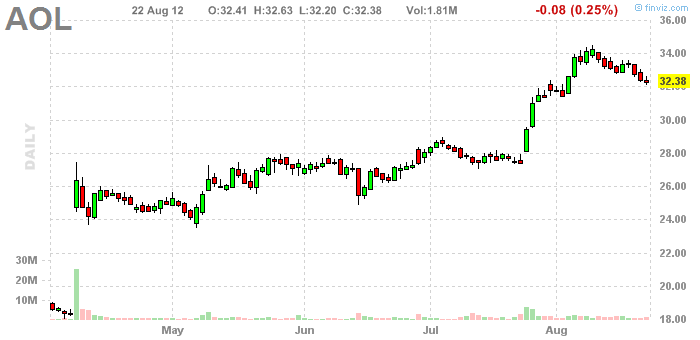
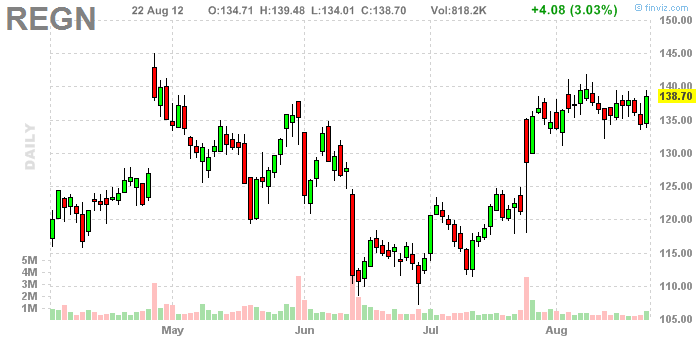
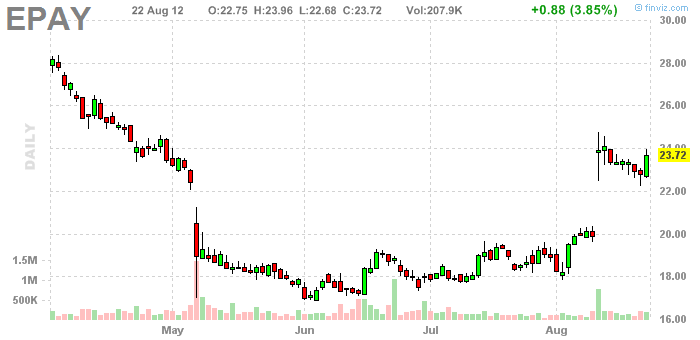
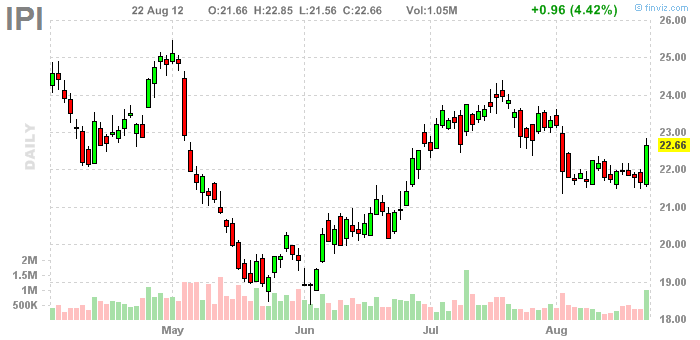
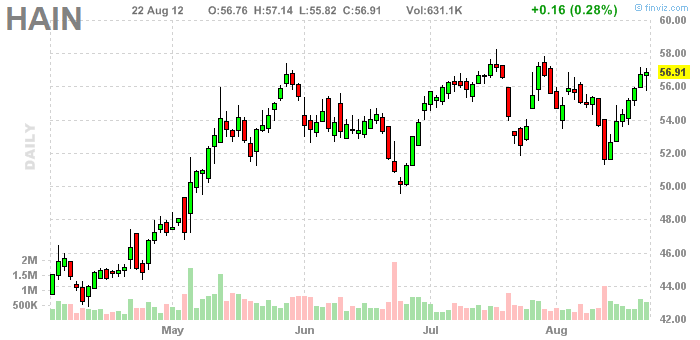


Swing Play

pullback play
Swing Play

145 possible target
Swing Play

24.5 possible target.
Swing Play

24 possible target
Stock To watch

Earnings last night.
domingo, 26 de mayo de 2013
Forex COBI - Chart To Watch at $.001
Forex
The above chart is what COBI looked like when I made it one of my charts to watch for my subscribers at $.001.
This is what COBI's chart looks like after the close today:

The above chart is what COBI looked like when I made it one of my charts to watch for my subscribers at $.001.
This is what COBI's chart looks like after the close today:
domingo, 19 de mayo de 2013
Earn All eyes on Fed
Earn 

It is Fed interest rate and policy decision day , so nothing much will happen till that time. Market has been anticipating Fed response to slowdown in economy.
Sometime the first reaction to the Fed is a fake out. As most would have seen there are number of studies that show Fed day to be positive day.
Sometime the first reaction to the Fed is a fake out. As most would have seen there are number of studies that show Fed day to be positive day.
viernes, 17 de mayo de 2013
Oil Gold & Copper Trends Are Still Higher: Holmes
Oil If you told me yesterday that the largest bank in the U.S. was going to report lackluster earnings results, and Standard & Poor's was going to take its credit rating clever to Europe, but the markets would largely shrug it off - I probably would have politely told said 'you're crazy!' Welcome to reality; it all happened today. And the little market that could clearly thinks it can still test higher levels and isn't going to let some silly headlines derail it. While JP Morgan (JPM), the big banks (^BKX), and the Euro are getting whacked today, it doesn't change the strategy of money managers like Frank Holmes, the CEO & CIO of US Global Investors, who says the crisis du jour has no bearing on the long term opportunities. 'I am a big believer that you buy gold on down days,' this transplanted Torontonian tells us from his new home in Texas. He believes this year could be 'one of those odd years' that the dollar and commodity prices rise together. And much as Holmes likes gold, he loves the gold miners (GDX) even more, largely because they got sold off alongside other stocks last year while the precious metal they produce rose 10%. 'I think the really big opportunity right now is gold stocks,' he says pointing to their relative price compared to spot gold, as well as their historically low price-to-book ratios, and in some cases dividend yields too. Among the names he likes and owns now are Yamana (AUY), RandGold Resources (GOLD), and lesser-known Franco Nevada (FNV) --which Holmes says pays a monthly dividend. As for the metal itself, Holmes is unmoved by the most recent developments and has had no change in his belief that 'anytime you have inflation running at 3% and you're getting 0.1% in a money market fund, it's always better to own gold.' He is similarly undaunted and unchanged in his conviction about copper and belief that China will successfully engineer a soft landing. He's staying long copper because of the country's plans to build 24,000 miles of high speed rail, and he likes the recent uptick in the JP Morgan Global Purchasing Managers Index, which signaled expansion for the first time in almost a year. 'I think copper will go higher,' he states. 'Just like oil can easily have supply restricted, you have seen copper restricted.' Related Quotes: JPM 35.92 -0.93 -2.52% ^BKX 43.44 -0.17 -0.39% XLF 13.81 -0.11 -0.75% EURUSD=X 1.268 -0.0029 -0.23% FXE 126.33 -1.43 -1.12% ^STOXX50E 2,338.01 -7.84 -0.33% FEZ 29.06 -0.57 -1.92% GCF12.CMX 1,632.40 -14.90 (-0.90%) GLD 159.26 -1.12 -0.70% IAU 15.97 -0.11 -0.68% GDX 54.05 -0.67 -1.22% AUY 15.68 -0.12 -0.76% GOLD 108.83 -2.03 -1.83% FNV 39.90 -0.40 -0.99% FXI 36.74 -0.10 -0.27% HGF12.CMX 3.597 -0.05 (-1.29%) COPX 13.91 -0.12 -0.86% CU 31.45 -0.33 -1.04%
lunes, 15 de abril de 2013
Earn Weidmann-Bundesbank profit will be crimped by reserves
Earn Weidmann-Bundesbank profit will be crimped by reserves BERLIN (Reuters) - The Bundesbank profit turned over to the federal government will be considerably smaller this year than in 2011 due to the risk provisions linked to the euro zone crisis, central bank president Jens Weidmann was quoted telling Der Spiegel. Weidmann said the German central bank had to raise its reserves due to the greater risks and had consulted with its accountants. In 2012 the Bundesbank had a 2.2 billion euro profit and set aside 1.6 billion for risks. 'The distributed profit will be considerably less than last year,' Weidmann said, without providing any specific numbers. Weidmann also said that he had doubts whether European central banks will be able to make a profit on Greek sovereign bonds that euro zone countries are eager to use as part of the latest Greek bailout. 'It's assumed that the central banks will earn a profit from purchasing the bonds. But that is not certain at all. On the contrary, the balance sheet risks have increased. And that affects not only the Greek bonds but also all the extraordinary monetary measures related to the crisis.' (Reporting By Erik Kirschbaum; Editing by Elaine Hardcastle)
domingo, 14 de abril de 2013
Signals Europe hit by downgrade speculation
Signals ROME (AP) -- Europe's ability to fight off its debt crisis was again thrown into doubt Friday when the euro hit its lowest level in over a year and borrowing costs rose on expectations that the debt of several countries would be downgraded by rating agency Standard & Poor's. Stock markets in Europe and the U.S. plunged late Friday when reports of an imminent downgrade first appeared and the euro fell to a 17-month low. The fears of a downgrade brought a sour end to a mildly encouraging week for Europe's heavily indebted nations and were a stark reminder that the 17-country eurozone's debt crisis is far from over. Earlier Friday, Italy had capped a strong week for government debt auctions, seeing its borrowing costs drop for a second day in a row as it successfully raised as much as €4.75 billion ($6.05 billion). Spain and Italy completed successful bond auctions on Thursday, and European Central Bank president Mario Draghi noted 'tentative signs of stabilization' in the region's economy. A credit downgrade would escalate the threats to Europe's fragile financial system, as the costs at which the affected countries — some of which are already struggling with heavy debt loads and low growth — could borrow money would be driven even higher. The downgrade could drive up the cost of European government debt as investors demand more compensation for holding bonds deemed to be riskier than they had been. Higher borrowing costs would put more financial pressure on countries already contending with heavy debt burdens. In Greece, negotiations Friday to get investors to take a voluntary cut on their Greek bond holdings appeared close to collapse, raising the specter of a potentially disastrous default by the country that kicked off Europe's financial troubles more than two years ago. The deal, known as the Private Sector Involvement, aims to reduce Greece's debt by €100 billion ($127.8 billion) by swapping private creditors' bonds with new ones with a lower value, and is a key part of a €130 billion ($166 billion) international bailout. Without it, the country could suffer a catastrophic bankruptcy that would send shock waves through the global economy. Prime Minister Lucas Papademos and Finance Minister Evangelos Venizelos met on Thursday and Friday with representatives of the Institute of International Finance, a global body representing the private bondholders. Finance ministry officials from the eurozone also met in Brussels Thursday night. 'Unfortunately, despite the efforts of Greece's leadership, the proposal put forward ... which involves an unprecedented 50 percent nominal reduction of Greece's sovereign bonds in private investors' hands and up to €100 billion of debt forgiveness — has not produced a constructive consolidated response by all parties, consistent with a voluntary exchange of Greek sovereign debt,' the IIF said in a statement. 'Under the circumstances, discussions with Greece and the official sector are paused for reflection on the benefits of a voluntary approach,' it said. Friday's Italian auction saw investors demanding an interest rate of 4.83 percent to lend Italy three-year money, down from an average rate of 5.62 percent in the previous auction and far lower than the 7.89 percent in November, when the country's financial crisis was most acute. While Italy paid a slightly higher rate for bonds maturing in 2018, which were also sold in Friday's auction, demand was between 1.2 percent and 2.2 percent higher than what was on offer. The results were not as strong as those of bond auctions the previous day, when Italy raised €12 billion ($15 billion) and Spain saw huge demand for its own debt sale. 'Overall, it underscores that while all the auctions in the eurozone have been battle victories, the war is a long way from being resolved (either way),' said Marc Ostwald, strategist at Monument Securities. 'These euro area auctions will continue to present themselves as market risk events for a very protracted period.' Italy's €1.9 trillion ($2.42 trillion) in government debt and heavy borrowing needs this year have made it a focal point of the European debt crisis. Italy has passed austerity measures and is on a structural reform course that Premier Mario Monti claims should bring down Italy's high bond yields, which he says are no longer warranted. Analysts have said the successful recent bond auctions were at least in part the work of the ECB, which has inundated banks with cheap loans, giving them ready cash that at least some appear to be using to buy higher-yielding short-term government bonds. Some 523 banks took €489 billion in credit for up to three years at a current interest cost of 1 percent.
viernes, 12 de abril de 2013
Signals Greece sets March 8 deadline for investors in bond swap
Signals Greece sets March 8 deadline for investors in bond swap The Parthenon on the Athens Acropolis is seen behind a Greek and an EU flag atop the Greek ministry of finance February 8, 2012. REUTERS/Yannis BehrakisEnlarge Photo The Parthenon on the Athens Acropolis is seen behind a Greek and an EU flag atop the Greek ministry of finance February 8, 2012. REUTERS/Yannis Behrakis ATHENS (Reuters) - Greece has set a March 8 deadline for investors to participate in its unprecedented bond swap aimed at sharply reducing its debt burden, according to a document outlining the offer. Greece formally launched the bond swap offer to private holders of its bonds on Friday, setting in motion the largest-ever sovereign debt restructuring in the hope of getting its finances back on track. In the document, Greece said the March 8 deadline could be extended if needed. Athens in the past has said it wants to conclude the transaction by March 12. The swap is part of a second, 130 billion euro ($175.02 billion) rescue package to claw Greece back from the brink of a default that had threatened to send shockwaves through the financial system and punish other weak euro zone members. ($1 = 0.7428 euros) (Reporting by George Georgiopoulos, Writing by Deepa Babington; Editing by Elaine Hardcastle)
domingo, 31 de marzo de 2013
Oil Japan sees upward pressure on yen waning
Oil Japan sees upward pressure on yen waning Foreign exchange dealers are seen beneath an electronic board displaying the Japanese Yen's exchange rate against the U.S. dollar at a foreign exchange trading company in Tokyo February 22, 2012. REUTERS/Kim Kyung-HoonEnlarge Photo Foreign exchange dealers are seen beneath an electronic board displaying the Japanese Yen's exchange rate against the U.S. dollar at a foreign exchange trading company in Tokyo February 22, 2012. REUTERS/Kim Kyung-Hoon By Tetsushi Kajimoto MEXICO CITY (Reuters) - A senior Japanese Finance Ministry official said the upward pressure on the yen was easing and he saw nothing strange in the currency's movements as it pulls away from record highs below 80 yen versus the dollar. The official, speaking after the first day of the weekend gathering of Group of 20 finance ministers and central bankers, said the yen was not discussed at the meeting which was dominated by talks on the euro-zone sovereign debt crisis. But the G20 did discuss volatility in currencies as well as crude oil prices, the official said, adding that these issues may be mentioned in the communique expected at the end of the meeting on Sunday. Brent crude futures settled near a 10-month high above $125 a barrel on Friday on heightened concerns over tensions with Iran about its nuclear program. Japanese authorities will continue to respond to excess volatility in currencies, he added, signaling readiness to intervene if speculators push up the yen too high again to deal a blow to the export-reliant economy. 'We hear opinions overall, including at deputies' meeting, that volatility exists in the foreign exchange market, so I expect (G20) may mention that volatility warants close monitoring,' the official said. 'We have said that (the yen's) moves have been excessive including before and after (last year's) earthquake, which was not reflecting economic fundamentals. But I see nothing strange in the current movement,' he added. The yen, meanwhile, tumbled across the board, a downtrend that started with the Bank of Japan's recent monetary easing. Japan's trade deficit, widening interest rate differentials with the United States favoring the dollar and rising crude oil prices also have hurt the yen's prospects. The dollar hit a fresh 7-1/2-month high of 81.062 yen on trading platform EBS and was last 80.990, away from 75.31 yen hit last October when Japan intervened heavily to protect exporters and drew criticism from the United States. The Bank of Japan, along with the European Central Bank and the U.S. Federal Reserve, is taking unconventional steps to boost the economy. The BOJ boosted asset purchases by 10 trillion yen on February 14 and pledged to keep ultra-easy policy until a 1 percent inflation goal is in sight. Bank of Japan Governor Masaaki Shirakawa said on Saturday that policymakers were also closely watching the effects of monetary easing on crude prices. But he said he did not see monetary easing as a big factor and the recent spike was more due to geopolitical tensions and some bright spots in advanced economies after the New Year. 'Generally speaking, we'll closely watch effects and side-effects of monetary easing,' he said. (Additional writing by Krista Hughes; Editing by Ed Lane)
miércoles, 13 de febrero de 2013
Signals Why You Shouldn't Manage Your Friends' Money
Signals Why You Shouldn't Manage Your Friends' Money So you put away some nice returns this year - not too shabby. While you can't be blamed for bragging about good performance, it's not uncommon for friends to want a part of the action. What would you do if a friend asked you to make investments on his or her behalf? In this article we'll show you the highs and lows of investing for others. Taking Advantage of Your Financial Knowledge It's no surprise that your pals might want you to manage a couple of bucks for them. If you're pulling down decent returns and talking about your investing strategies, you've now become the go-to guy (or girl). These days, money talks and people who understand the financial world are getting a lot of respect as young people realize there's more to investing than they once thought. If you have financial knowledge, people who know you might view you as a very valuable commodity - a free money manager. All too often, the person asking you to invest his or her money is the person who knows a little something about investing - just enough to get into trouble. If you're nailing double-digit returns this year, why couldn't you repeat the performance year after year, right? The Problems with Investing for Others You may think that investing for someone else is just a way of helping out a friend, but the thing is, when you start investing for other people, particularly your friends, you enter a world of complications that you might not have foreseen when you started out. Unrealistic Expectations That friend of yours, the one who thinks that your 35% returns this year are going to happen next year as well, might be in for a nasty surprise when your picks make next to nothing. When you invest for friends, you have to deal with unrealistic expectations that can really put a damper on a relationship. If your friends wants you to invest for them, they likely don't understand all of the risks involved with investing, including not quite meeting the investment goals that they may have been projecting. Losing a Friend's Money Not meeting a friend's investing expectations could jeopardize your friendship, but falling short of your friend's projected returns could be a best-case scenario. When things go wrong, making some money is a lot better than losing money, which isn't an abstract concept for anyone who invests actively. When you bring money into a relationship, things can get uncomfortable pretty fast, especially when that money is hemorrhaging out of an investment account. Do you tell the friend to suck it up? Do you repay the person out of your pocket? Do you try to make up the difference with new picks? Really, there probably isn't a good way to deal with losing a friend's money and you should consider this risk before you agree to invest for anyone. Legal Matters Managing a friend's money is a sticky business and if you go through with it you may be breaking the law. Investment professionals must be registered with the Securities and Exchange Commission or have a federal license. They are heavily regulated by the government and by trade organizations like the National Association of Securities Dealers, for the protection of consumers. If you invest for a friend for compensation, you could be breaking laws that are in place to protect investors from people who aren't qualified to have discretionary control over others' accounts. Short End of the Stick Despite the drawbacks, investing for friends isn't always doomed to failure. With skill, smarts and a whole lot of luck, you might rake in the cash. If that's the case, you still have to consider whether or not your friend is taking advantage of you. Helping out a friend is nice, but when that help consists of making significant amounts of money for that person and getting little or nothing in return, you might be suffering from an off-balance relationship. What You Can Do for Friends Now that I've taken the wind out of your sails, and your friend's as well, there are things that you can do to help your friends' investments without burdening yourself with the substantial responsibility of investing someone else's money. One of the best ways to lend a hand is to help teach your friend about investing. Help Them Learn There are a lot of pitfalls out there for new investors. If you're lucky, you've been able to avoid quite a few of them or you learned how you should have gone about avoiding them. The benefit of your experience can be one heck of an asset to pass on to a friend and it won't cost either one of you personally or financially. Therefore, if you want to help your friends, work with them; show them how to analyze a financial statement, how to execute a trade online, how to look up business news, or how to find online resources. Investment Clubs Going farther still, there is a popular way to invest hands-on with friends without taking on the responsibility that an investment advisor would feel for a client - the investment club. The investment club consists of a group of people who vote to decide whether or not to buy or sell their group-owned investments. Investment clubs are great, because they allow a more personal approach with actual investments than just helping someone with investing concepts. These clubs will also give you a vested interest in performance of your friend's portfolio. If you're interested in starting an investment club, there are plenty of resources available, ranging from your broker to the internet. It's important to recognize that an investment club isn't just a couple of people who want to invest together - it's a formal (and legally defined) organization with members who have an equitable claim to their assets. This means you should look into the rules and laws that govern investment clubs where you live before joining or starting one yourself. The Bottom Line Investing for a friend usually isn't worth the amount of trouble it can cause. Money just isn't something you want to bring into a good friendship. In the end, by helping your friends invest on their own, you'll be doing them, and yourself, a much bigger favor.
Oil Obama seeks power to merge agencies
Oil WASHINGTON (AP) -- President Barack Obama on Friday took aim at his government's own messy bureaucracy, prodding Congress to give him greater power to merge agencies and promising he would start by collapsing six major economic departments into one. Pressing Republicans on one of their own political issues, Obama said it was time for an 'effective, lean government.' Obama wants the type of reorganizational authority last held by a president when Ronald Reagan was in office. Obama's version would be a so-called consolidation authority allowing him to propose only mergers that promise to save money and shrink government. The deal would help Obama considerably by entitling him to an up-or-down vote from Congress in 90 days. Still, final say would remain with lawmakers, both on whether to grant Obama this fast-track authority and then in deciding whether to approve any of his specific ideas. 'We can do this better,' Obama declared in an event with business owners at the White House, even presenting slides to help make his case. 'So much of the argument out there all the time is up at 40,000 feet, these abstract arguments about who's conservative or who's liberal,' Obama said. 'Most Americans — and certainly most small business owners — you guys are just trying to figure out how do we make things work, how do we apply common sense. And that's what this is about.' In an election year and a political atmosphere of tighter spending, Obama's move is about more than improving a giant bureaucracy. He is attempting to directly counter Republican arguments that he has presided over the kind of government regulation, spending and debt that can undermine the economy — a dominant theme of the emerging presidential campaign. Republicans have often aligned themselves with smaller government. So politically, Obama is trying to put the onus on Republicans in the House and Senate to show why they would be against the pursuit of leaner government. From Capitol Hill, a spokesman for Sen. Mitch McConnell of Kentucky, the top Republican in the Senate, pledged Obama's plan would get a careful review. But the spokesman, Don Stewart, also said: 'After presiding over one of the largest expansions of government in history, and a year after raising the issue in his last State of the Union, it's interesting to see the president finally acknowledge that Washington is out of control.' Obama has an imperative to deliver. He made the promise to come up with a smart reorganization of the government in his last State of the Union speech last January. At the time, Obama grabbed attention by pointing out the absurdity of government inefficiency. In what he called his favorite example, Obama said: 'The Interior Department is in charge of salmon while they're in fresh water, but the Commerce Department handles them when they're in saltwater. And I hear it gets even more complicated once they're smoked.' The White House said the problem is serious for consumers who turn to their government for help and often do not know where to begin. Not in decades has the government undergone a sustained reorganization of itself. Presidents have tried from time to time, but each part of the bureaucracy has its own defenders inside and outside the government, which can make merger ideas politically impossible. That's particularly true because 'efficiency' is often another way of saying people will lose their jobs. Obama hopes to enhance his chances by getting Congress to give him the assurance of a clean, relatively speedy vote on any of his proposals. There is no clear sign that Obama would get that cooperation. He spent much of 2011 in utter gridlock with Republicans in Congress. In the meantime, Obama announced Friday that Karen Mills, the administrator of the Small Business Administration, would be elevated to Cabinet-level rank. But her job would essentially disappear if Obama has his way. If he gets the new fast-track power to propose legislation, Obama's first project would be to combine six major operations of the government that focus on business and trade. They are: the Commerce Department's core business and trade functions; the Small Business Administration; the Office of the U.S. Trade Representative; the Export-Import Bank; the Overseas Private Investment Corporation; and the Trade and Development Agency. The goal would be one agency designed to help businesses thrive. The White House says 1,000 to 2,000 jobs would be cut, but the administration would do so through attrition; that is, as people routinely leave their jobs over time. The administration said the merger would save $3 billion over 10 years by getting rid of duplicative overhead costs, human resources divisions and programs. The name and potential secretary of the new agency have not been determined. The point, the White House says, is not just making the government smaller but better by saving people time and eliminating bureaucratic nightmares. The idea for the consolidated business agency grew out of discussions with hundreds of business leaders and agency heads over the last several months. Brendan Buck, a spokesman for House Speaker John Boehner, R-Ohio, said streamlining government was always a potentially good idea but expressed wariness about whether Obama's plan would really help business. 'American small businesses are more concerned about this administration's policies than from which building in Washington they originate,' Buck said. 'We hope the president isn't simply proposing new packaging for the same burdensome approach.' According to the White House, presidents held such a reorganizational authority for about 50 years until it ran out during Reagan's presidency in 1984. Obama has a series of other ideas about consolidating departments across the government, to be rolled out later.
lunes, 11 de febrero de 2013
Earn Airbus expects years of grappling with A380 cracks
Earn Airbus expects years of grappling with A380 cracks Companies: European Aeronautic Defence and Space NV RELATED QUOTES Symbol Price Change EAD.PA 31.10 +0.28 Related Content An A380 aircraft is seen through a window with an Airbus logo during the EADS / Airbus 'New Year Press Conference' in Hamburg January 17, 2012. REUTERS/Morris Mac MatzenView Photo An A380 aircraft is seen through a window with an Airbus logo during the EADS / Airbus 'New Year Press Conference' in Hamburg January 17, 2012. REUTERS/Morris Mac Matzen FRANKFURT (Reuters) - Airbus will need years to get past problems with wing cracks on its flagship A380 passenger jet, the executive vice president of programs at Airbus told a German magazine. 'This problem will keep us busy for years,' weekly Der Spiegel quoted Tom Williams as saying in an article published on Sunday. European air safety regulators last month ordered checks for A380 wing cracks for the entire superjumbo fleet after safety engineers found cracks in almost all planes inspected. Airbus, the plane maker owned by EADS (PAR:EAD.PA - News), has said a combination of design and manufacturing slips put too much stress on a handful of the 2,000 brackets that fix the exterior of each wing to the ribcage beneath. The magazine said Williams aimed to present a solution for the problem in April, and Airbus will start installing new parts in planes by the end of the year.
martes, 5 de febrero de 2013
Forex How the Election and Economy Will Impact Your Portfolio
Forex There's plenty of data to help handicap the market during Presidential election years and it happens to be siding on the investor's team when it comes to an incumbent up for re-election. Jeffrey Hirsch, the editor-in-chief of the Stock Trader's Almanac crunched those numbers and says since the beginning of the Dow in 1896, an incumbent president has run for re-election 19 times; 14 of those were up years for the DJIA. 'Just the fact that there's somebody in office running again is a good sign for the year — 9% on average — what happens is early on if it's a real popular president doing well the market stays up,' Hirsch says. 'If you've got someone really unpopular come election time and they get ousted, there's a rally in November/December, sort of a 'ding dong the witch is dead' type of rally.' As for those five times when the trend didn't hold, only two were particularly bad years: 1932 which saw the removal of Herbert Hoover and 1940 when World War II was already raging in Europe. It's not just the election that offers insight into the next eleven and a half months. Hirsch notes that the end of the 'deflation fear period' should be a good sign in the short-term, but further down the road it 'puts a cap on things.' He cites a housing market that picked up and then flat-lined, consumer confidence that has come up (but not enough), and improving unemployment numbers as a sign that the economy is on the mend. He says it is 'good enough to keep us from having a really bad year' but not good enough to see a breakout to new highs. Specifically Hirsch is looking at 5-10% growth year-over-year, with a Dow target somewhere between 13,000 and 13,500. Still, he cautions the economy, the election, Europe and any number of other international factors could lead to amended forecasts in either direction. Then there's the market volatility — the same that plagued investors throughout 2011. Hirsch says it's here to stay again in 2012. 'Come spring you start looking for a technical trigger,' says Hirsch. 'Get a little bit more on the sidelines, take some profits, cover yourself...and then get back in for the year-end rally...Trade the seasons, trade the range and you should do okay.' How are you playing the election year, the economy and the volatility? Tell us on our Facebook page or in the comments below. Related Quotes: ^DJI 12,428.26 -21.19 -0.17% ^IXIC 2,715.99 +5.23 +0.19% ^GSPC 1,291.70 -0.78 -0.06%
Forex 5 Unusual Sales Taxes You Need To Avoid
Forex 5 Unusual Sales Taxes You Need To Avoid With the economy still struggling, states are getting fairly crafty with how they charge consumers via sales taxes. It's no secret that dubious, yet all-too enforceable government laws have been with us since the dawn of the civilized world. In ancient Egypt, the pharaohs taxed cooking oil – of course, the main seller of cooking oil was the pharaoh. During the first century AD, the Roman empire taxed urine – a popular source of ammonia for common tasks like tanning hides and cleaning clothes. Then at the height of the Dark Ages (an era in European history notorious for its poor hygiene), some European governments taxed the sale of soap! Unfortunately, onerous and unusual state taxes are still very much with us. What are some of the biggest offenders – and are they active in your state? Here's our top five: Food Packaging Tax States like Colorado have a weird definition of what constitutes food packaging. In using the term 'essential' in its tax language for such commodities, Colorado finds itself in the strange position of taxing paper cup lids and napkins, but not paper cups or fast-food French fry containers. Hot Air Balloon Tax If you're in Kansas and in the mood to take a ride in a hot air balloon, beware of the state government's 'amusement' tax. State regulation makes balloon rides taxable. But there is a caveat – only balloon rides that are tied, or tethered to the ground, are considered taxable. So, if you want to avoid paying taxes when taking a balloon ride over Topeka, make sure to leave the rope at home! Careful on That Bagel New York State has an interesting way of handling bagels – and taxes on buying bagels. If you want to eat a bagel tax-free, don't have the deli counter 'prepare' it for you (i.e., add cream cheese or cut the bagel in two pieces). Prepare that bagel yourself, and you don't have to pay a tax on it. Wet Fuse In West Virginia, celebrating the Fourth of July – or any celebration where fireworks are used, can lighten your wallet. The state has a special tax – on top of its 6% sales tax – on things like ladyfingers and sparklers. Fruit Cakes California has gone bananas over the purchase of fruit by consumers. If you buy an apple from a regular retailer, you're in good shape, as the purchase is tax-exempt. If you buy fruit from a vending machine – and who hasn't done that – you'll pay an additional 33% on the amount of the purchase. Maybe the most egregious case of over-taxation on a state level comes from Pennsylvania, where the commonwealth actually taxes the use of air (on carwash vacuum cleaners). The Bottom Line The above taxes certainly aren't the only taxes on statewide level, but they are surely among the most unique. This site has a more complete list of sales taxes in all 50 states: http://retirementliving.com/RLtaxes.html .
sábado, 26 de enero de 2013
Signals Swing trading opportunities
Signals


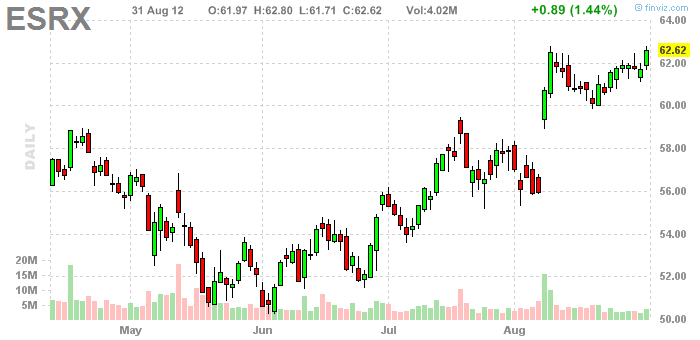
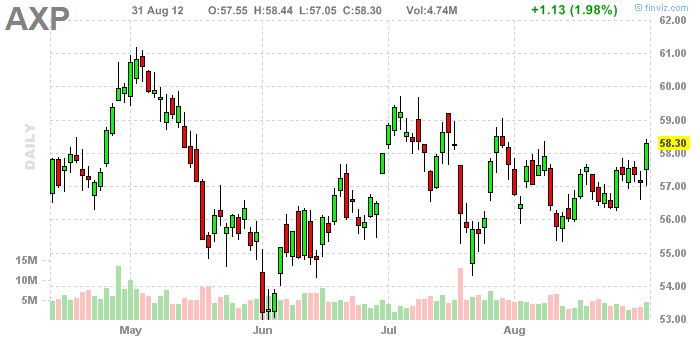
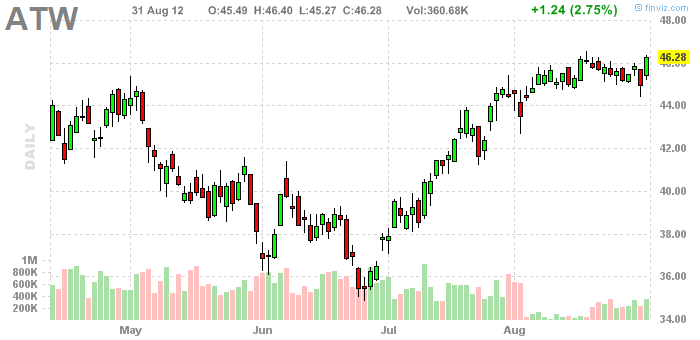
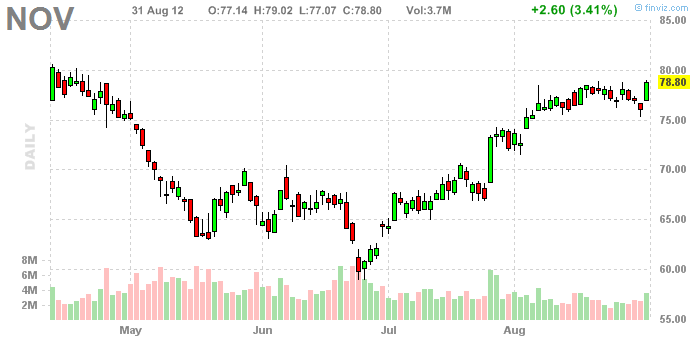


Several stocks are breaking out and there are some nice setups showing up in our scans. Many stocks are going sideways during market consolidation and are now breaking out.






martes, 8 de enero de 2013
Oil Multi year range breakout
Oil
The market had a breakout last week. The breakout was preceded by 13 days of base. The breakout also coincides with market taking out multi year high.
Below the surface quality breakouts on momentum stocks are increasing. The breadth trends are positive for last couple of weeks.


The market had a breakout last week. The breakout was preceded by 13 days of base. The breakout also coincides with market taking out multi year high.
Below the surface quality breakouts on momentum stocks are increasing. The breadth trends are positive for last couple of weeks.
lunes, 7 de enero de 2013
Signals Holding the gains
Signals 

The market is holding on to its gains after few days of rally. In the past 3 month every such rally attempt has faded after 4 to 5 days. As of now if the market can hold its gains for few weeks then it will have better chance of taking out the high.
The large cap continue to attract interest. Small caps have been under performing. Small caps tend to make big moves in most bull market. They are the engine of growth. Small companies can dramatically grow on Q/Q basis and as a result can quickly double or triple.
The large cap continue to attract interest. Small caps have been under performing. Small caps tend to make big moves in most bull market. They are the engine of growth. Small companies can dramatically grow on Q/Q basis and as a result can quickly double or triple.
Oil ISIS swing trade setup.
Oil



ISIS is breaking out . Good swing trading setup for 8 to 20% profit potential.
sábado, 5 de enero de 2013
jueves, 3 de enero de 2013
Forex Quest for the golden cross
Forex Quest for the golden cross RELATED QUOTES Symbol Price Change MA 348.79 +0.96 XOM 85.83 -0.94 PFE 21.48 -0.15 K 49.73 -0.26 TRI 27.82 -0.10 By Rodrigo Campos NEW YORK (Reuters) - January has turned out strong for equities with just two trading days to go. If you're afraid to miss the ride, there's still time to jump in. You just might want to wear a neck brace. The new year lured buyers into growth-related sectors, the ones that were more beaten down last year. The economy is getting better, but not dramatically. Earnings are beating expectations, but at a lower rate than in recent quarters. Nothing too bad is coming out of Europe's debt crisis - and nothing good, either - at least not yet. 'No one item is a major positive, but collectively, it's been enough to tilt it towards net buying,' said John Schlitz, chief market technician at Instinet in New York. Still, relatively weak volume and a six-month high hit this week make some doubt that the gains are sustainable. But then there's the golden cross. Many market skeptics take notice when this technical indicator, a holy grail of sorts for many technicians, shows up on the horizon. As early as Monday, the rising 50-day moving average of the S&P 500 could tick above its rising 200-day moving average. This occurrence - known as a golden cross - means the medium-term momentum is increasingly bullish. You have a good chance of making money in the next six months if you put it to work in large-cap stocks. In the last 50 years, according to data compiled by Birinyi Associates, a golden cross on the S&P 500 has augured further gains six months ahead in eight out of 10 times. The average gain has been 6.6 percent. That means the benchmark is on solid footing to not only hold onto the 14 percent advance over the last nine weeks, but to flirt with 1,400, a level it hasn't hit since mid-2008. The gains, as expected, would not be in a straight line. But any weakness could be used by long-term investors as buying opportunities. 'The cross is an intermediate bullish event,' Schlitz said. 'You have to interpret it as constructive, but I caution people to take a bullish stance, if they have a short-term horizon .' GREECE, U.S. PAYROLLS AND MOMENTUM Less than halfway into the earnings season and with Greek debt talks over the weekend, payrolls data next week and the S&P 500 near its highest since July, there's plenty of room for something to go wrong. If that happens, the market could easily give back some of its recent advance. But the benchmark's recent rally and momentum shift allow for a pullback before the technical picture deteriorates. 'We bounced off 1,325, which is resistance. We're testing 1,310, which should be support. We are stuck in that range,' said Ken Polcari, managing director at ICAP Equities in New York. 'If over the weekend, Greece comes out with another big nothing, then you will see further weakness next week,' he said. 'A 1 (percent) or 2 percent pullback isn't out of the question or out of line.' On Friday, the S&P 500 (Chicago Options:^INX - News) and the Nasdaq Composite (Nasdaq:^IXIC - News) closed their fourth consecutive week of gains, while the Dow Jones industrial average (DJI:^DJI - News) dipped and capped three weeks of gains. For the day, the Dow dropped 74.17 points, or 0.58 percent, to close at 12,660.46. The S&P 500 fell 2.10 points, or 0.16 percent, to 1,316.33. But the Nasdaq gained 11.27 points, or 0.40 percent, to end at 2,816.55. For the week, the Dow slipped 0.47 percent, while the S&P 500 inched up 0.07 percent and the Nasdaq jumped 1.07 percent. A DATA-PACKED EARNINGS WEEK Next week is filled with heavy-hitting data on the housing, manufacturing and employment sectors. Personal income and consumption on Monday will be followed by the S&P/Case-Shiller home prices index, consumer confidence and the Chicago PMI - all on Tuesday. Wednesday will bring the Institute for Supply Management index on U.S. manufacturing and the first of three key readings on the labor market - namely, the ADP private-sector employment report. Jobless claims on Thursday will give way on Friday to the U.S. government's non-farm payrolls report. The forecast calls for a net gain of 150,000 jobs in January, according to economists polled by Reuters. Another hectic earnings week will kick into gear with almost a fifth of the S&P 500 components posting quarterly results. Exxon Mobil (NYSE:XOM - News), Amazon (NasdaqGS:AMZN - News), UPS (NYSE:UPS - News), Pfizer (NYSE:PFE - News), Kellogg (NYSE:K - News) and MasterCard (NYSE:MA - News) are among the names most likely to grab the headlines. With almost 200 companies' reports in so far, about 59 percent have beaten earnings expectations - down from about 70 percent in recent quarters. (Reporting by Rodrigo Campos; Additional reporting by Chuck Mikolajczak and Caroline Valetkevitch; Editing by Jan Paschal)
martes, 1 de enero de 2013
Oil A slow grinding higher move
Oil 

The market is grinding higher in a channel. 3 to 4 days of rallies are followed by 3 to 4 days of down moves. The buyers lack vigor and selling is muted.
Underlying action on many stocks is sideways. As this kind of action has continued for few months, many stocks are setting up well. But absent breadth thrust breakouts are fading.
In this climate anticipation of breakout or breakdown is better approach than chasing breakouts or breakdown.
Underlying action on many stocks is sideways. As this kind of action has continued for few months, many stocks are setting up well. But absent breadth thrust breakouts are fading.
In this climate anticipation of breakout or breakdown is better approach than chasing breakouts or breakdown.
Suscribirse a:
Entradas (Atom)






